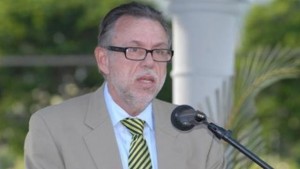 Let me begin by congratulating on their appointment the new Commissioner of Police Ian Queeley and his High Command. They inherit a monumental but not insurmountable task. I wish them every and early success.
Let me begin by congratulating on their appointment the new Commissioner of Police Ian Queeley and his High Command. They inherit a monumental but not insurmountable task. I wish them every and early success.
Our country faces a serious crisis that could reverse all the advances that have been made in the past 50 years. We stand to lose more than a half of one per cent of our population through homicide in ten years. If that is not a crisis I don’t know what is. It is the equivalent of the United States losing one and a half million of its residents to murder in ten years.
As you know I have very recently written a book entitled Breaking the Cycle – Politics, Constitutional Change and Governance in St. Kitts and Nevis. My book contains a chapter headed The Social Contract in which I discuss the issue of violent crime and its impact on our community. I list 20 underlying factors which have contributed in varying degrees to the alarming increase in violent crime. I will in this interview refer to some of these factors but I prefer to focus on the solutions.
I am confident that the new police High Command will redouble past efforts. I recognize the efforts that are being made to improve the response of law enforcement to the crisis. However that alone will not solve it. There must be a unified, national effort to reverse the mistrust of the police that is prevalent in the communities.
Unless that happens the police will, whatever resources are provided them, continue to fight crime with one hand tied behind their back.
The appalling prison conditions are another factor. As my legal colleague Emile Ferdinand QC said on one of your programmes the prison is a university of crime.
The political culture also contributes. The problem of violent crime should not be politicized. It has been to too great an extent. That should not continue. The political parties should jointly recognize and commit to addressing the crisis. The police need this type of support.
But improved policing, better prisons and less politics would not be enough in the long term. We must address the aggression and lack of discipline which prevail. These result in part from the negative attitudes which have evolved and which we see reflected on a daily basis on our streets and in our institutions. These attitudes have been exacerbated by the tribal politics.
We have to do a much better job at parenting and educating our children. Too many children are being brought up by television and video games and without role models while their so called parents go merrily about their business leaving the society to have to mop up the problem they create. Are you surprised that young men who have been brought up in this way find security in their peers in gangs?
The way in which our people react to each other is also a contributing factor. Parents disrespecting and verbally assaulting teachers is the norm. The parent/child relationship is too often violent. The other day a mother passed by me with her child who was being disobedient. The mother shouted ” A bet a bus you head.” That child will grow up thinking that violence is the way to resolve disputes and to impose discipline. It is all too prevalent conduct. The young men have taken the aggression, social disorder and verbal violence they grow up seeing on a daily basis to another level using guns.
The changes in attitude which are an essential ingredient of the solution will not come easily. It will take time but the society must start collectively and without further delay to address them. We have the wherewithal to do so but we need the will and the leadership. I refer not only to political leadership but leadership within Civil Society which must play a key role in the solution. Too many members of Civil Society are enjoying their cushy lives and are afraid to talk out and act on social issues. They should appreciate that their lives will no longer be so cushy if they become penned into their homes by fear of violent crime.
The time has come for our society to drop the politics from and to unify in addressing the deep and serious issues we face.
